2001: A Space Odyssey 4K Blu-ray Movie
Home2001: A Space Odyssey 4K Blu-ray Movie 
4K Ultra HD + Blu-ray + Digital CopyWarner Bros. | 1968 | 149 min | Rated G | Dec 18, 2018
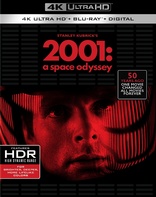
Movie rating
8.7 | / 10 |
Blu-ray rating
| Users | 4.8 | |
| Reviewer | 5.0 | |
| Overall | 4.8 |
Overview
2001: A Space Odyssey 4K (1968)
A mysterious black monolith appears on Earth in prehistoric times, changing the course of human evolution. When it reappears on the Moon in 2001, astronauts embark on an ill-fated interplanetary voyage to discover.
Starring: Keir Dullea, Gary Lockwood, William Sylvester, Daniel Richter, Leonard RossiterDirector: Stanley Kubrick
| Drama | Uncertain |
| Epic | Uncertain |
| Mystery | Uncertain |
| Sci-Fi | Uncertain |
| Adventure | Uncertain |
Specifications
Video
Video codec: HEVC / H.265
Video resolution: 4K (2160p)
Aspect ratio: 2.20:1
Original aspect ratio: 2.20:1
Audio
English: DTS-HD Master Audio 5.1 (48kHz, 16-bit)
English: DTS-HD Master Audio 5.1 (48kHz, 16-bit)
French: Dolby Digital 5.1 (448 kbps)
German: Dolby Digital 5.1 (448 kbps)
Italian: Dolby Digital 5.1 (448 kbps)
Spanish: Dolby Digital 5.1 (448 kbps)
Spanish: Dolby Digital 5.1 (448 kbps)
Portuguese: Dolby Digital 2.0
Polish: Dolby Digital 2.0
Japanese: Dolby Digital 2.0
Subtitles
English SDH, French, German, Italian, Japanese, Portuguese, Spanish, Arabic, Cantonese, Croatian, Czech, Danish, Dutch, Finnish, Greek, Hebrew, Hindi, Hungarian, Korean, Mandarin (Simplified), Norwegian, Polish, Romanian, Russian, Swedish, Thai, Turkish
Discs
Blu-ray Disc
Three-disc set (3 BDs)
Digital copy
4K Ultra HD
Playback
Region free
Review
Rating summary
| Movie | 5.0 | |
| Video | 5.0 | |
| Audio | 5.0 | |
| Extras | 4.0 | |
| Overall | 5.0 |
2001: A Space Odyssey 4K Blu-ray Movie Review
Back to the Future (in 4K UHD).
Reviewed by Jeffrey Kauffman October 30, 2018Hang on to your childhood knick knacks, they may end up being worth considerable bucks one day. As a burgeoning film fanatic even in my pre- teen years, I was determined that I was going to understand 2001: A Space Odyssey, a film which was confounding a lot of people (including adults) back in the day, even well past its original roadshow engagements. Sometime after the film was released, but before I personally had seen it for the first time, I found a paperback called The Making of Kubrick’s ‘2001’, edited by Jerome Agel, which went into some detail about the film, and, if I recall correctly, actually included a reprint of Arthur C. Clarke’s short story The Sentinel, which many have (in my estimation correctly) seen as at least a spark of inspiration for what 2001: A Space Odyssey ultimately became. (If the Agel book didn’t contain The Sentinel, it at least referred to it, because I know I read the Clarke story as well as Clarke's novelization of the screenplay in preparation for going to the theater to see the film for the first time.) I thought of the Agel book again as I revisited this remastered version of the film in preparation for this review, and in looking online found that it’s going for quite a bit more than I remember paying for it decades ago. Of course, it has a little competition now from any number of other printed analyses, including a really deluxe hardback out from the venerable folks at Taschen. At any rate, my reading paid off, for though I was a kid when I first sat in wonder and maybe even awe watching 2001: A Space Odyssey, I had no problem following its tale of human evolution perhaps nudged along by some all knowing — well, something that seems to like large black rectangles that emit music by György Ligeti.
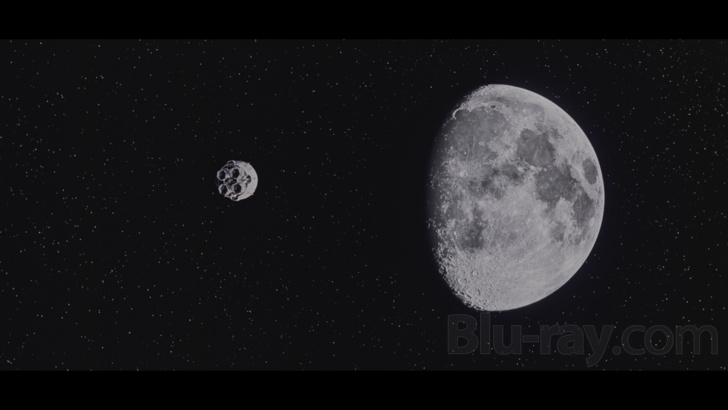
Part of what may have potentially confused audiences back in the day may not have had that much to do with plot, which, when divorced from some of the astounding imagery Kubrick aggregated for the film, really isn’t that hard to follow, but rather to its pace. This is a weirdly static film for a story that gets us from “The Dawn of Man” to a Starchild. There’s been so much written about 2001: A Space Odyssey over the years that I won’t provide yet another plot summary (there’s a fairly basic one in our long ago 2001: A Space Odyssey Blu-ray review from 2007), but I would encourage newcomers to this film to really take a deep, maybe even meditative, breath before embarking on this epochal journey, because Kubrick is really in no rush to dole out a cinematic thrill every ten pages, or whatever the Syd Field model dictates. That "leisurely" pace begins with the surprisingly long atonal music that plays even before Leo the Lion shows up, but it continues through The Dawn of Man sequence (where one sixties critic famously complained that Kubrick held "each and every" shot too long), and a lot of the subsequent material, where both a tamped down emotional aspect and long stretches of nothing, or not much, happening tend to give a feeling that's maybe the cinematic equivalent of the Discovery One astronauts in cryogenic stasis. But one of the things about 2001: A Space Odyssey that continues to impress now fifty years after its original release is how deliberate it all is, from its weird “monolithic” imagery to its then provocative use of classical music to accompany science fiction tinged imagery to its almost prescient treatment of an out of control artificial intelligence.
2001: A Space Odyssey 4K Blu-ray Movie, Video Quality 
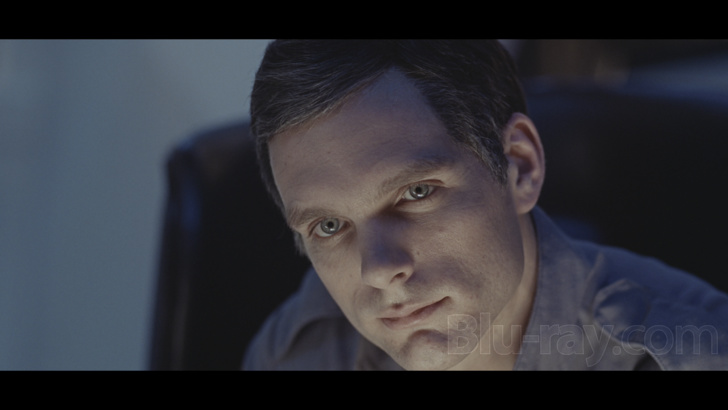
Note: I'm repeating some of the verbiage from my review of the 1080p Blu-ray in the first paragraph below. Content related solely to the
4K release begins with the second paragraph.
2001: A Space Odyssey is presented on 4K UHD courtesy of Warner Brothers Home Entertainment with a 2160p transfer in
2.20:1, and already that aspect ratio should be an early tipoff that things are definitely "new and improved" from the long ago Blu-ray release. As is
documented in an actually fascinating two page "history" of the restoration provided by Warner's Stuart Herriott for this release, "the 2018 release
contains correct picture aspect ratio as it was scanned directly from the 65mm original negative which is spherical (flat) versus anamorphic (scope).
The 35mm anamorphic (scope) reduction that was scanned for the 2000 and 2007 releases contained a little more information on the left and right
of the frame then [sic] was intended for 2.2 70mm projection aspect ratio. Also, the optical scope reduction added a slight amount of linear image
distortion, which is not present in the 65mm spherical camera negative." Mr. Herriott's detailed accounting of the long and involved restoration
process, which Mr. Herriott traces back to photochemical work begun in 1999 (if I'm understanding things correctly) makes it clear that Warner,
typically a commendable curator of its catalog, has approached this title with the care and handling that it deserves, and those who were fearful of
Christopher Nolan's perceived "revisionism" can probably relax. So, with that out of the way: how does the darned thing look? Pretty
spectacular in sum, though as Mr. Herriott also gets into, those who are going to utilize previous home video releases as the standard against which
this release is measured may quibble with some aspects, notably the color timing, which is noticeably different in some respects from previous
releases. As Mr. Herriott mentions, "audiences may be most familiar with previous home video releases. . .and may be struck by some of the
differences. However, the newly remastered version has been scanned and timed to directly match the original film release, rather than the
previous home video master." Some of the most noticeable differences happen right off the bat in The Dawn of Man sequence, where there's a
slightly more desaturated look, with a brighter overall ambience that tends to make skies paler. But there are some interesting new changes here,
albeit often on minor things like the weirdly mid(21st?)century modern chairs on the space station, which have a kind of crimson tone to them now.
Restoration efforts have also eliminated some of the projection effect anomalies that were prevalent in previous versions, and I frankly noticed none
of the admittedly minor speckling and dirt that were in evidence on the previous Blu-ray release. Detail levels are superb throughout the
presentation, and there's a nicely organic looking grain field, one that spikes expectedly in many of the optical effects, but which resolves without
any issues whatsoever. Blacks looked solid and (for those who may have feared) unboosted, and the entire palette looks appealingly saturated, and
what Mr. Herriott terms as "luminance and color" dropping at the sides of the image on the older version has been eliminated.
The psychedelic climax is bold and vivid and certainly better detailed than I remember seeing in 35mm reduction prints.
The 4K UHD presentation takes an already stellar (sorry) 1080p Blu-ray and delivers even more fine detail and (especially) shadow detail, as well as
an often spectacularly suffused palette. I noticed all sorts of new information watching the film in 4K, much of it admittedly minor things like some
of the information on the displays in the Discovery One, or even some of the background set dressing in the pod that Dave and Frank think they're
"hiding out" in. Fine detail remains remarkably intact even given some of the rather severe lighting, especially reds, that suffuse so many of the
space set scenes. In fact, one of the "reddest" scenes, the "decommissioning" of HAL, offers really superb fine detail on Dave's face, this despite not
just the slathering of red hues, but the fact that he's in a space helmet. Other "helmet" based items like the sudden aging Dave is subject to in the
big finale are also noticeably more detailed. Grain is finely resolved throughout this 4K presentation, appearing arguably a bit more variable in
terms of intensities and thickness than in the 1080p version. The palette attains some really interesting new highlights courtesy of Dolby Vision.
The opening Dawn of Man sequence has a kind of gray-sepia tone in this version that isn't quite as prevalent in the 1080p version, but some of the
later sequences, like Dr. Floyd arriving at the monolith on the moon, almost mimic black and white films for a moment or two, with an emphasis on
silvers and grays. As mentioned above, the incredible reds scattered throughout this presentation were one of the most memorable elements of the
4K presentation, and the whole final hallucinogenic ride through the lightshow and then the weirdly altered landscapes are also better detailed now,
with an incredibly vivid (if weirdly skewed) palette. Younger viewers more used to digital capture may feel this is soft at times, a kind of ironic
reaction to the incredible detail a large format offers, but those who have seen 2001: A Space Odyssey projected and want their home
media to replicate that appearance will most likely find this a very enjoyable and worthwhile viewing experience.
I wanted to address a couple of issues I saw mentioned in our forum by stating that I didn't experience elevated black levels on things like the
"widescreen" bars, and my Oppo 4K player did not "stutter" or "freeze" during the HAL "decommissioning" sequence.
2001: A Space Odyssey 4K Blu-ray Movie, Audio Quality 
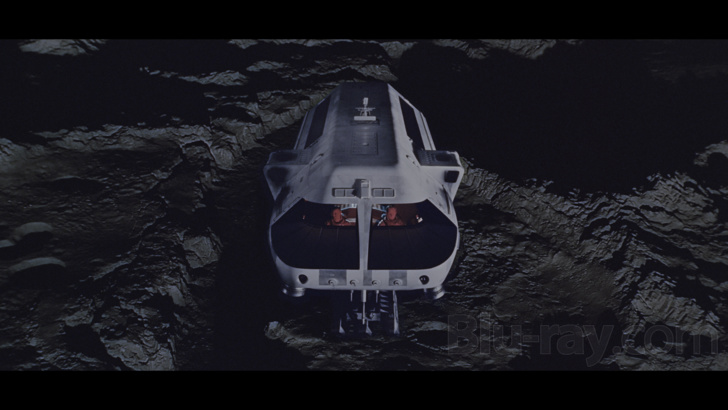
2001: A Space Odyssey features two DTS-HD Master Audio 5.1 tracks, one listed as restored and remixed (which the accompanying press sheet identifies as having been "completed in 1999 (for the previous DVD and Blu-ray releases)" and a new 5.1 repurposing of the original theatrical 6 track audio. I frankly didn't hear a ton of difference between the two in terms of actual surround activity, though occasionally individual effects like the "hiss" of air that underlies several sequences involving Dave either outside of the ship or inside after HAL has gone berserk sounded a bit more forward in the mix to my years in the original theatrical version. The biggest difference to me was a clear if arguably fairly slight brighter quality to the higher frequencies of the "restored and remixed" track, something that can be especially discerned during some of the music, especially some of the "odder" source cues that tend to play under scenes featuring the monolith. That said, you can hear what I'm talking about even in the "prelude" music that occurs during the first couple of minutes before any actual imagery begins. The original theatrical track's higher frequencies don't sound muffled in any major way, but they're not quite as bright (and some might say strident) as on the remixed version. That said, I was personally a bit more impressed by the low end on the original theatrical track than on the remixed version, though it's again a probably incremental difference. Again, during some of the louder music cues, there's a slightly rumbly quality that may be slight distortion but which I feel in some instances (notably the quote from Also Sprach Zarathustra) are probably endemic to the original recordings. As fans of the film know, dialogue in this outing is actually on the sparse side, but is always rendered cleanly and clearly, and the effects are typically often placed smartly in the surround channels to develop what is strangely both a kind of claustrophobic and a wide open mix. There are a number of fantastic sound design choices in the film that may actually startle newcomers to 2001, and I'd only point out how brilliantly Kubrick and his team actually utilize silence at some key junctures. There's been a lot of chatter about perceived "changes" to the video side of things with this release, but some who don't mind at least a bit of revisionism may wonder what a Dolby Atmos or DTS:X remix might have offered to this release, at least in addition to the "original" mixes included here, since the film's sound design certainly provides ample opportunity for those kind of effects, but the two tracks here should certainly satisfy most ardent audiophiles.
2001: A Space Odyssey 4K Blu-ray Movie, Special Features and Extras 
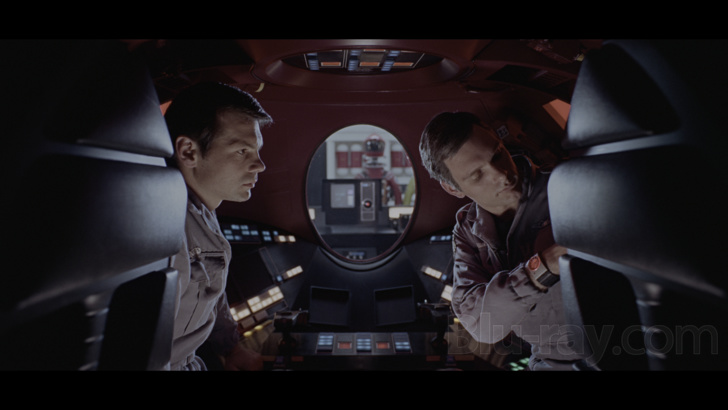
The 4K UHD disc ports over the Audio Commentary by Keir Dullea and Gary Lockwood. Additionally, the slipcase also houses an envelope containing a nicely illustrated booklet and four images from the film printed on cardstock. For those who care about packaging issues, Warner has the 4K UHD disc on its own spindle on the right of the keepcase, and both the feature film 1080p Blu-ray and the second Blu-ray disc with the bulk of the supplements on one spindle on the left. The second disc with special features has all of the supplements detailed in our 2001: A Space Odyssey Blu-ray review . My score reflects the sum total of this package, not just the sole bonus on the 4K UHD disc.
2001: A Space Odyssey 4K Blu-ray Movie, Overall Score and Recommendation 
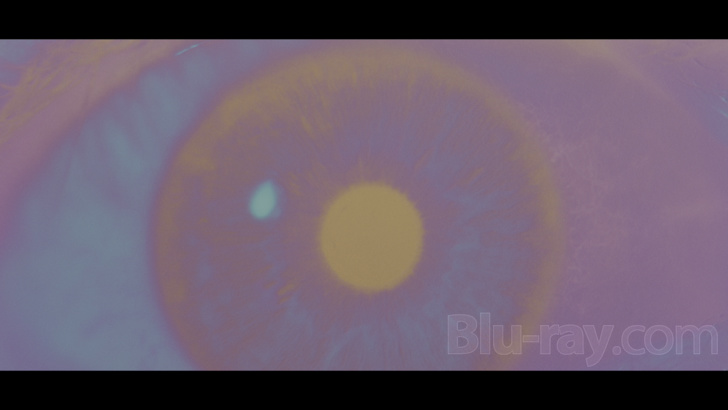
While it may or may not bear repeating, this 4K UHD release is another example of "let's wait until the disc actually arrives and we've watched it" to decide how it looks (and sounds). This is one of the nicest presentations of a large format film that I've personally had the pleasure of reviewing. It was an amazing experience to see this as a little boy, and that sense of childhood wonder returned and was perhaps even amplified seeing the film now in 4K. Warner has traditionally been one of the more consistent studios in terms of excellent handling of its vast catalog, and 2001: A Space Odyssey is another jewel in its already well studded crown. Highly recommended.
Other editions
2001: A Space Odyssey: Other Editions

2001: A Space Odyssey 4K
1968

2001: A Space Odyssey 4K
Recalled - w/ No Fade Error Version
1968

2001: A Space Odyssey 4K
1968

2001: A Space Odyssey
Love Hurts Slipcover
1968

2001: A Space Odyssey
Remastered
1968

2001: A Space Odyssey
Remastered
1968

2001: A Space Odyssey
1968

2001: A Space Odyssey
1968
Similar titles
Similar titles you might also like

Ad Astra
2019

Interstellar 4K
2014

Moon
2009

High Life
2018

The Man Who Fell to Earth
Limited Collector's Edition
1976

Silent Running
1972

Outcasts: Season One
2011

Planet of the Apes
1968

Contact
1997

THX 1138
The George Lucas Director's Cut
1971

Arrival 4K
2016

Close Encounters of the Third Kind 4K
40th Anniversary Edition
1977

Midnight Special
2016

Things to Come
1936

Gravity
Includes "Silent Space" version
2013

Space: 1999: The Complete Series
1975-1977

The Wild Blue Yonder
2005

The Martian 4K
Extended Edition
2015

Solaris
Солярис / Solyaris
1972

Passengers
2016